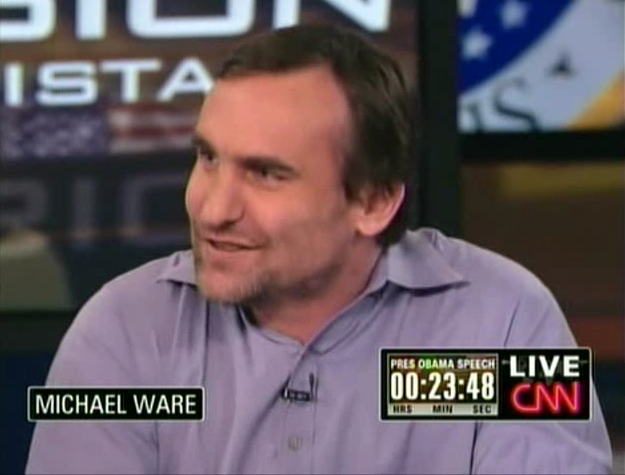
Michael Ware
CT: "Is the president finally ready to fight this war or not?"
Tuesday, December 01, 2009

Length: 4:16
LARGE (49.6 MB)
-----
SMALL (5.2 MB)
Less than 30 minutes prior to the speech, Campbell Brown introduces "the best foreign policy team on television" -- Michael, Christiane Amanpour, Nic Robertson, Barbara Starr, and Chris Lawrence.
WOLF BLITZER: We're here with our top analysts, our top reporters, many of whom have spent quite a bit of time in Afghanistan. They know this terrain quite well. Campbell, there is no doubt that this is going to be the president's war as of tonight.
CAMPBELL BROWN: It is indeed, Wolf. And with me now, I think the most appropriate place to start, probably the best foreign policy team in television. But you guys have all been there. You've been on the ground in Afghanistan. You've spent a lot of time with the military commanders. Christiane Amanpour, start us off with what you think he must convey tonight, given the vast number of audiences he is speaking to.
CHRISTIANE AMANPOUR, CNN CORRESPONDENT: He's got to convey that he is in it for the long-term in terms of getting the job done, as he himself has said. Obviously he has a domestic constituency here so he's talking about starting to withdraw. But the last thing people out there want to hear is an exit strategy or a definite timeline. They want to hear that the Taliban is going to be beat back.
Because the first thing people out there want is security. And then they want to hear that there is going to be some kind of development so that they can actually have some kind of better livelihood. This is not going to be won by bombs and bullets alone. This is going to be by bread and butter, better livelihoods, books, education, that kind of thing. And that's what is going to have to happen.
BROWN: But Nic Robertson, you have been there. Is this something that can be achieved given the timeline that's being laid out?
NIC ROBERTSON, CNN SENIOR INTERNATIONAL CORRESPONDENT: If the timeline is 18 months to see significant improvement so that you can start drawing down, that seems to be very rapid and perhaps overly ambitious at this particular stage. We've been told now it's a generational thing that is going to happen in Afghanistan. Education takes time to trickle through. Building up security forces takes time. The police in particular are very weak. Getting rid of the corruption within the government is no overnight fix either. So it does seem as if this is a very tight timeline to really be wanting to draw down sufficient numbers to show that we are actually coming out.
BROWN: And Barbara Starr, you are leaving, I know, for Afghanistan I believe in the morning. You've talked to the military commanders. They've been briefed on this. They know the numbers that he is talking about, the commitment he is willing to make. Is it enough in their view?
BARBARA STARR, CNN PENTAGON CORRESPONDENT: Well, the question is, is it enough for the young soldier or marine on the ground. The young kid who's got one more nighttime patrol, one more ambush to live through, one more convoy through insurgent territory. They're going to want to hear what is in this speech that is going to make their job more safe, and what about the 30,000 troops that are going? What is in this that is going to make it possible for them to win?
BROWN: And Chris Lawrence, you're just back. You've been talking to them. Is that what they want to hear? Is that what they want the president to convey?
CHRIS LAWRENCE, CNN CORRESPONDENT: I think they'll be looking beyond this speech to see what their commanders say about how this is going to affect their particular unit. Those teams that go out and clear the roads of IEDs, will they be able to get more eyes on the roads so the insurgents don't come and replant the bombs after they go through? It's that level of detail that I think the individual soldiers are going to be looking at after this speech.
BROWN: And quickly, Michael Ware, our cynic. You have been known to be our cynic on occasion. How optimistic are you?
MICHAEL WARE, CNN CORRESPONDENT: Well, it depends. Is the president finally ready to fight this war or not? We've seen eight years of America failing to fight the war in Afghanistan, either on the development front or tactically on the battlefield. Now sending an extra 30,000 troops is the first start. But that in a vacuum is not enough.
And something else we need to be keenly aware of, and we may or may not hear this tonight from the president. The war is not ultimately going to be won or lost in Afghanistan. You've got to get Pakistan to stop tacitly supporting the Taliban. To do that, you need to allay Pakistan's fears about India, because India essentially backs the Afghan government. So there is so many moving pieces. We even see the subtle hand of Iran in there helping the Taliban. There are so many moving pieces here that just sending troops alone just to fight is not going to be enough.
BROWN: Before we get into some of the politics on this, because there is so much more to talk to, I want to go back to Wolf to get a sense, Wolf, from what people on the ground who are there now are feeling about tonight as well.